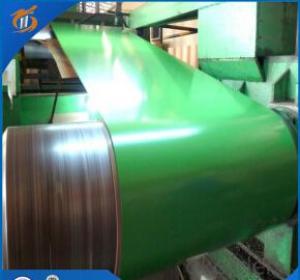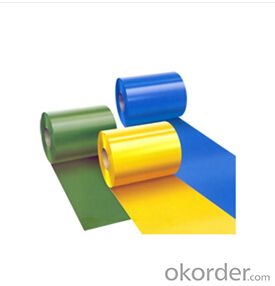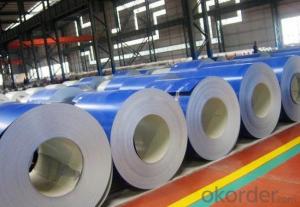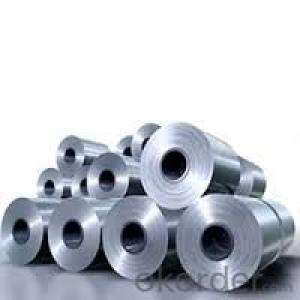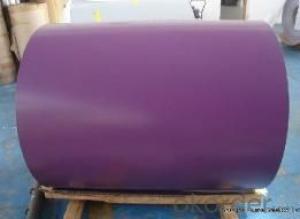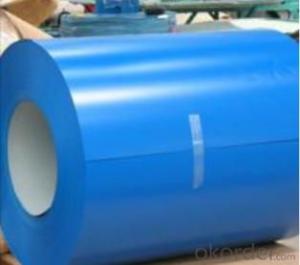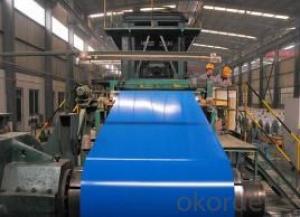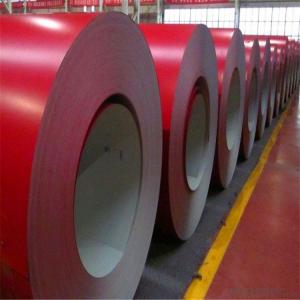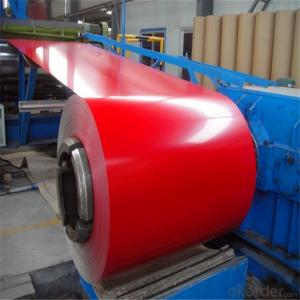PPGI Color Coated Steel Coil for Construction
- Loading Port:
- Shanghai
- Payment Terms:
- TT OR LC
- Min Order Qty:
- 25 m.t.
- Supply Capability:
- 10000 m.t./month
OKorder Service Pledge
OKorder Financial Service
You Might Also Like
Basic Info.
Model NO.:JISG3312, SGCC
Surface Treatment:Galvanized
Certification:ISO, SGS
Technique:Cold Rolled
Standard:ASTM, JIS, AISI, DIN
Application:Container Plate
Edge:Slit edge
Stock:Stock
Steel Grade:Q235B
Thickness:0.12mm-3.0mm
Coil Weight:3-8 Tons
Gloss:65%-80%
Export Markets:Global
ID:508mm
Zinc Coating:50g-250g/Psm
Feedback:Within 24 Hours
Additional Info.
Packing:Export Standard Package or as Request
Standard:AISI, ASTM, BS, DIN, GB, JIS
HS Code:7210701000
Production Capacity:150, 000tons/Year
Product Description
Specifications:
1. Thickness: 0.12mm-1.3mm
2. Width: 600mm-1250mm
3. Length: According to client's demands
4. Top paint: 15 to 25 um (5 um + 12-20 um)
Back paint: 7 +/- 2 um
5. Gloss: Normal or High gloss
6. Zinc coating: Z50-Z275G/psm
7. Inside Diameter: 508mm/610mm
8. Outside Diameter: 1000mm-1500mm
9. Coil weight: 3-8 tons
10. Payment: T/T, L/C, D/P, Paypal, Western Union
11. Trade Term: FOB, CFR, CIF
12. MOQ: 25 Mt
13. Package: Export standard package or as request
14. Shipment: By container
15. Standard: AISI, ASTM, BS, DIN, GB, JIS
16. Grade: JIS G3322, CGLCC, ASTM A755, CS-B
Basic Information:
Product/Service (We Sell): steel sheet pile, steel rail, h-beam, rebar, steel pipe, steel strip, plate ,stainless steel and galvanized steel.
Number of Employees: about 100 People.
Trade & Market
Main Markets:
North America, Canada
Export Percentage: 65% - 81%
- Q: I looking at replacing a few of the panels on my car with either Carbon Fiber or High Tensile Steel to shave off some weight and increase mpg and take some time off my quarter mile. Which is better: Carbon Fiber or High Tensile Steel?
- Because no matter how hard the helmet is it can not prevent brain damage from your brain slapping the inside of your skull. If the helmet was able to absorb the energy from an impact and prevent you brain from moving inside your skull it would have to be huge and everyone would look like bubble heads riding on bikes. The sides would have to be around 12 inches thick on each side and top to provide that much protection and would probably break your neck if you were in a wreck. Hope I have been helpful.
- Q: Steel used to be made in the #92;Bessemer Converter, write about how steel making processes today produce better quality steel????
- Steel making today is a faster process as use Blast furnace which Coke Limestone Iron ore are fed into the top of the furnace. after these are fed in a exothermic happens and converts these ores into Iron. Iron is not strong enough to be used in thing this is formally known as pig iron. To convert Iron ore into steel it has to go to a process called the BOS Basic Oxygen Steel-making were oxygen is blown onto the iron ore for about 30 to 45 min and this then turns it into steel as all the impurities are taken out and this floats on top and known as slag and used for things such as road building. Once you have steel this is then pored into ladles and taken to the continuous caster and rolled into slabs, billets and bars and then cut off and rolled into a finished products and then taken to compniaes to be made into thins you see made out off metal such as skyscrapers. Hope this helps :o)
- Q: which pokemon has the most steel pokemon???
- Transformers.
- Q: How are steel coils used in the food processing industry?
- Steel coils are commonly used in the food processing industry for various purposes such as storage, transportation, and cooking. They are often used to create food storage containers, tanks, and silos, ensuring a safe and hygienic environment for storing raw materials or processed food. Steel coils are also used in the construction of equipment like ovens, grills, and fryers where they provide heat conductivity and durability. Additionally, steel coils are used for manufacturing conveyor belts and other machinery parts, allowing for efficient food processing and packaging operations.
- Q: How are steel coils labeled for identification?
- Steel coils are typically labeled for identification using stickers or tags that contain information such as the coil number, dimensions, weight, grade, and other relevant details.
- Q: What are the common coil transportation options?
- The common coil transportation options include trucking, rail transportation, and shipping via barges or vessels.
- Q: Can steel coils be used in high-temperature applications?
- Yes, steel coils can be used in high-temperature applications. Steel is known for its excellent strength and resistance to heat, making it a suitable material for various industrial processes that involve high temperatures. It can withstand and maintain its structural integrity even under extreme heat conditions.
- Q: How are steel coils processed and shaped into various products?
- Steel coils are processed and shaped into various products through a series of manufacturing processes. First, the steel coil is uncoiled and cleaned to remove any impurities. Then, it goes through a process called leveling, where the coil is flattened and straightened. Next, the steel is cut into the desired length or shape, using techniques like shearing or slitting. After that, it may undergo additional processes such as forming, bending, or rolling to give it the desired shape. Finally, the steel is often treated with coatings or finishes to enhance its durability and appearance.
- Q: What are the common methods of testing the strength of steel coils?
- Common methods of testing the strength of steel coils include tensile testing, hardness testing, and bend testing. Tensile testing involves subjecting the steel coil to tension until it reaches its breaking point. This test measures the maximum amount of force the coil can withstand before it fractures. It provides valuable information about the tensile strength, yield strength, and elongation properties of the steel. Hardness testing is another common method used to determine the strength of steel coils. It measures the resistance of the steel to indentation or scratching. Various methods, such as Rockwell, Brinell, or Vickers tests, are employed to measure the hardness of the steel. Hardness testing provides information about the material's ability to resist deformation or wear. Bend testing is performed to evaluate the ductility and flexibility of the steel coil. In this test, the coil is bent to a specific angle and inspected for signs of cracking or fracturing. Bend testing helps determine the material's ability to withstand bending or forming processes without failure. Other methods of testing the strength of steel coils may include impact testing, where a controlled impact is applied to the coil to assess its resistance to sudden loading conditions, and fatigue testing, which involves subjecting the coil to cyclic loading to determine its endurance limit and potential for failure under repeated stress. It is important to note that the specific testing methods employed may vary depending on the intended application and industry standards. Additionally, non-destructive testing techniques, such as ultrasonic testing or magnetic particle inspection, can be used to detect internal defects or flaws in steel coils without causing damage to the material.
- Q: How are steel coils used in the production of elevator components?
- Steel coils are an essential component in the production of elevator components. These coils are made from high-quality steel that is specifically designed to meet the demanding requirements of elevator manufacturing. One of the primary uses of steel coils in elevator production is for the manufacturing of elevator doors. The coils are processed into flat sheets and then cut into the desired dimensions to create the doors. These doors require strength and durability to withstand frequent use and ensure passenger safety. Steel coils provide the necessary structural integrity and resistance to deformation that is necessary for elevator doors. Additionally, steel coils are also used in the manufacturing of elevator cabins. The coils are processed and formed into various shapes to create the walls and flooring of the elevator cabins. The strength and rigidity of steel make it an ideal material for this purpose, as it can withstand heavy loads and provide a secure and stable environment for passengers. Moreover, steel coils are used in the production of elevator shafts. The coils are rolled into cylindrical shapes and welded together to create the structural framework of the elevator shafts. These shafts need to be strong and rigid to support the weight of the elevator and ensure smooth and safe vertical movement. Steel coils provide the necessary strength, stability, and load-bearing capacity for this critical component of elevator systems. In summary, steel coils are vital in the production of elevator components such as doors, cabins, and shafts. Their strength, durability, and versatility make them suitable for creating reliable and safe elevator systems that can transport passengers efficiently and securely.
Send your message to us
PPGI Color Coated Steel Coil for Construction
- Loading Port:
- Shanghai
- Payment Terms:
- TT OR LC
- Min Order Qty:
- 25 m.t.
- Supply Capability:
- 10000 m.t./month
OKorder Service Pledge
OKorder Financial Service
Similar products
Hot products
Hot Searches
Related keywords
